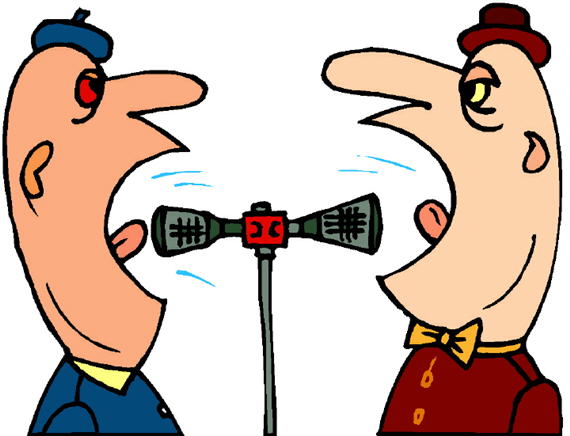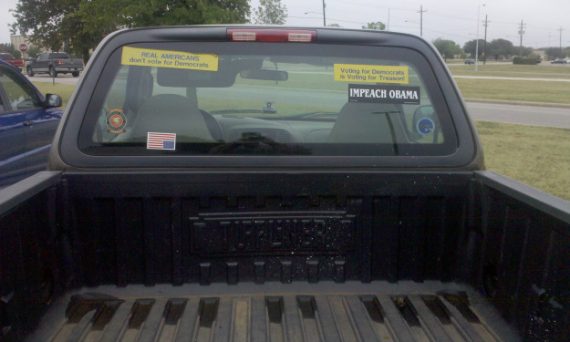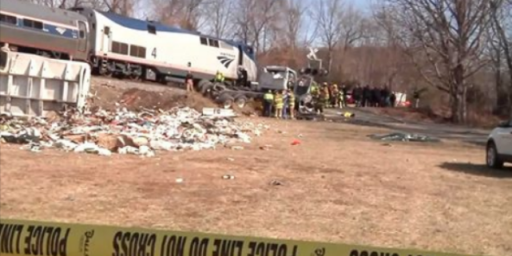Free Speech For Soldiers and Government Employees?
Should members of the Armed Forces and other public employees have the same rights under the 1st Amendment as the rest of us? Or should they be more like journalists?
The leadership at NPR took special care to remind its staffers yesterday of company policy requiring that they take every precaution to avoid the appearance of favoritism. Jim Romenesko published internal memos from CEO Vivian Schiller and senior VP Ellen Weiss telling the staff “no matter where you work at NPR you should be very mindful that you represent the organization and its news coverage in the eyes of your friends, neighbors and others. So please think twice about the message you may be sending about our objectivity before you attend a rally or post a bumper sticker or yard sign.” Additionally, “NPR journalists may not run for office, endorse candidates or otherwise engage in politics. Since contributions to candidates are part of the public record, NPR journalists may not contribute to political campaigns, as doing so would call into question a journalist’s impartiality” and “NPR journalists may not participate in marches and rallies involving causes or issues that NPR covers, nor should they sign petitions or otherwise lend their name to such causes, or contribute money to them. This restriction applies to the upcoming John Stewart and Stephen Colbert rallies.”
Apparently, they’re also not allowed to learn how to spell Jon Stewart’s name, lest it convey awareness that he’s been on the air for more than a decade.
While this may go a smidgen too far, it’s the right message. While I’m sympathetic to Jeff Jarvis‘ arguments against the “View From Nowhere,” it makes sense for institutions in the business of presenting the news to avoid giving the impression that they have axes to grind.
At the other end of the spectrum, Pat Sajak takes to NRO to make a peculiar argument:
I’m not suggesting that public employees should be denied the right to vote, but that there are certain cases in which their stake in the matter may be too great. Of course we all have a stake in one way or another in most elections, and many of us tend to vote in favor of our own interests. However, if, for example, a ballot initiative appears that might cap the benefits of a certain group of state workers, should those workers be able to vote on the matter? Plainly, their interests as direct recipients of the benefits are far greater than the interests of others whose taxes support such benefits.
He’s not saying — he’s just saying.
In actuality, I’m sympathetic to this view. There is something vaguely unsettling about people who make their living from tax dollars banding together to vote themselves a greater share of the rest of our money. And I say that as someone who’s been on state or federal payrolls (teaching, military) much of my career. But it’s not as unsettling as stripping the basic rights of citizenship from people because of how they make their living. While faceless bureaucrats in Washington and the gang at the local DMV aren’t sympathetic characters, this is a very hard sell when you realize that “public employees” also include soldiers, intelligence officers, schoolteachers, and the like. (See the outrage every couple of years when there’s the prospect that the absentee ballots of soldiers voting overseas may not count.)
Turning full circle, though, members of the military have rather strict limitations on their ability to engage in political speech. While not quite as strict as NPR’s code, they’re not allowed to run for partisan office, attend rallies in uniform, and so forth. But there are gray areas. For example, Tom Ricks points to the stickers on this truck at Fort Hood:
Ricks thinks this violates Article 88’s prohibition of “contemptuous words against the President, the Vice President, Congress, the Secretary of Defense, the Secretary of a military department, the Secretary of Transportation, or the Governor or legislature of any State, Territory, Commonwealth.” But that’s only true if the truck belongs to a commissioned officer. This punitive article doesn’t apply to enlisted men or, presumably, warrant officers. (I hesitate because the legal status of warrant officers has changed since I left service, making the matter murkier.)
As a general rule, soldiers are allowed to offer opinions on matters of public policy so long as they do so in a way that makes it clear that they’re speaking for themselves, not as official representatives of the military. The specific guidelines for this aren’t laid out in the UCMJ but rather in various Service regulations, pamphlets, and letters.
Perhaps something closer to Sajak’s prohibition is in order? Even though it’s clear to me that a soldier driving a truck with stickers calling for the impeachment of the Commander-in-Chief and suggesting that supporters of our nation’s oldest political party are not only not “REAL AMERICANS” but committing treason, it’s likely not so clear to the average member of the public. If not, it undermines the public confidence in civilian control of the military and improperly lends the prestige of the uniform to a very unsavory worldview. If nothing else, we should probably extend Article 88’s reach to cover all uniformed personnel.
I’m not sure where the line should be drawn. Something like 1 in 7 Americans who earn a paycheck receive it from government. They shouldn’t be disenfranchised or have their freedom unduly limited. But they are, in theory anyway, public servants.








“I’m not sure where the line should be drawn.”
Since I’m sure you claim to be a commonsense sort of guy and have held a commission Jim, I find this comment a little odd. As a practical matter I would have thought it fairly obvious where lines need to be drawn in the military. It may be more debatable in the highway dept.
BJ: It’s clear that it should be drawn on the other side of those stickers. How far on the other side, I don’t know.
That’s not half as unsettling as groups banding together to give campaign contributions to politicians to bribe them into supporting legislation that will benefit them directly. I am amazed that anyone with even ponder the idea that voting in this country should be anything other then one person one vote yet be so completely comfortable with the access, influence, and outright quid-pro-qou that comes attached to large campaign contributions that are often anonymous.
The hysterical thing about this post James is the obvious fact that everyone in the military getting a paycheck from the government? Have you ever mused about the armed services being prevented from voting since they rely on government funding for their jobs? For that matter what about companies who benefit from government largess? Should we prevent them form donating to political campaigns? (Frankly I’m all for that since they get more government goodies then anyone, especially military contractors).
How about medicare and SS recipients? We kick them off the voter rolls and we take care of the Tea Party problem overnight. Frankly this idea that individuals voting in their self-interest is the big reasons spending is out of control is laughable on it’s face, the reason spending is out of control is because the people that finance campaigns demand it.
Uh, Rick, please read posts before commenting on them. Thanks.
Rick, you think the Tea Party is a problem? Please explain.
James,
I’m sorry, I thought you said you were sympathetic Sajak’s view. Oh wait, you did, which is what prompted my comment. Yes, I realize the post was on the idea that there is some equivalency between the military and government workers WRT freedom of speech, but the injection of the pat Sajak thing was kind of bizarre and dangerous and your thinking along these lines is pretty half baked when you consider the implications (which i did). Which is why, I suspect, you decided to be dismissive.
The military is under restrictions because they are an instrument of American foreign policy and as a result the personal political views of those in it can be detrimental to our interests and, as you correctly point out, destructive to the chain of command and military moral. If I wanted to say something about that I would point out that the public employees have no such impact so the idea that anyone would even spend time mulling it over seems odd.
Pete,
Because the tea party movement seems to have a large demographic with the “receiving government largess set” and the problem is, if we accept the idea that Pat Sajak talked about and that James is sympathetic to, then these people couldn’t vote thereby rendering the Tea Party politically irrelevant.
I know military officers who choose not to vote exactly because they feel it’s wrong for them to do so. They think those who are eating buttered bread should not have the power to decide how much butter is put on that bread.
My father-in-law, a career intelligence officer, also chose not to vote. He believed that any activity in the political sphere would compromise his ability to remain objective in his work. Not having a dog in any political fight, he believed, kept him mostly out of the way of snarling curs.
I think that extending this rule to enlisted personnel is not a bad idea, but will be very hard to implement. It will get a lot of pushback, especially if implemented now. To handle it properly, it needs to come from a large group of senior officers and NCOs spearheading the effort. It should be timed to take effect after an election.
I like the idea of what NPR is doing with its journalists. The media is important as it has an amplification effect on politics. The lone serviceman does not have nearly the effect of an anchorperson or network. I dont really expect the media in general to follow rules as rigorous as those of NPR, but I think we could reasonably expect transparency. The media have free speech protections, but we have little to protect us, the people, from media. Perhaps requiring that donations be made public would be adequate.
Steve
James Joyner says:
Thursday, October 14, 2010 at 08:57
“BJ: It’s clear that it should be drawn on the other side of those stickers.”
yes a few hints would be in order I think.
I agree with Antonin Scalia — the only people in the country who should be free to speak are the billionaires. Everyone else should be grateful for their kind leadership.
This is why I think public sector unions should be banned from lobbying and making political contributions. It’s bad enough that they don’t have the main check that private sector unions have (namely, that if they push too hard, the company might go out of business).
@Rick
The rest of the same paragraph is a very huge “but.” I explicitly reject his prescription. For that matter, I introduce the passage — which is going around on several websites — by calling it “peculiar.”
@Joe
I’ve given you several paragraphs of hints.
How soon we forget. During the entire Clinton Administration various Base and Post Commanders (worldwide) issued “instructions” and “regulations” about “partisan” bumper stickers and decals on vehicles operated (by military personnel) on a military installation.
There were also Senior Officers and some not so senior personnel (officer, warrants, NCOs and enlisted) that faced “charges” under the UCMJ for contemptuous speech against elected civilian officials.
I’m just bemused, maybe even surprised by NPR issuing this, they sure had NO PROBLEM during the Bush Administration of showing their personal partisan support.
Does the Sajak position imply that those getting a Social Security check, and those on Medicare (or Medicaid) should be prevented from voting in elections where the issues surrounding those programs are in play?
James,
Your right … you did … my bad. No excuse.